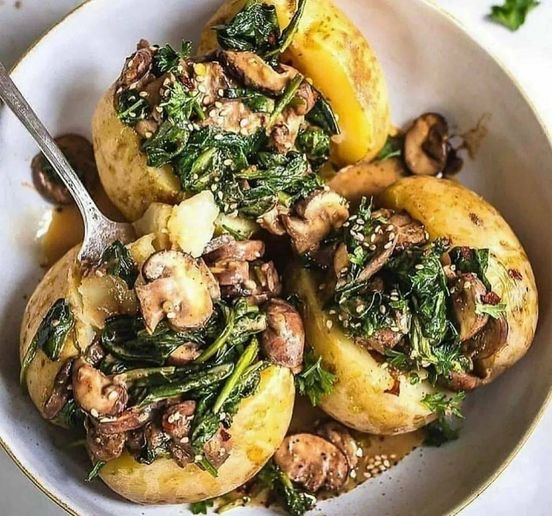Ingredients:
4 russet potatoes
1 tbsp coconut oil
2 cloves garlic , finely chopped
4 cups (250g) cremini mushrooms
pinch salt
1 tbsp almond butter
1 tbsp balsamic vinaigrette
1 tbsp lemon juice
4 cups baby spinach (approx. 2 handfuls)
- Preheat oven to 425F/215C. Poke holes around each potato using a fork (this will help the heat to escape while baking). Wrap each in tin foil and bake in the oven for 40-50, or until you can easily poke through the cooked potatoes with a toothpick.
- In a skillet add coconut oil, garlic, sliced mushrooms and pinch salt. Cook on medium heat for 5-10 minutes.
- Whisk together almond butter, balsamic and lemon juice and pour over mushrooms. Continue cooking until mushrooms are browned and ready to eat, then toss in baby spinach and cook until wilted (2-3 minutes). Slice open baked potatoes and fill with mushroom and spinach medley. Optional to drizzle with vegan gravy.
Stuffed Baked Potatoes with Mushroom and Spinach

Indulge in Comfort: Stuffed Baked Potatoes with Mushroom and Spinach
Embarking on a culinary journey often involves finding solace in the familiar, yet daring to elevate it with innovative twists. Enter the stuffed baked potatoes with mushroom and spinach—a comforting classic revamped with a tantalizing blend of earthy mushrooms, vibrant spinach, and creamy potatoes. As the aroma wafts through the kitchen, anticipation builds, promising a symphony of flavors and textures that transcend the ordinary.
A Feast for the Senses
Picture this: golden-brown potatoes, their skins crisped to perfection, cradle a filling bursting with savory goodness. With each bite, your palate is treated to a harmonious medley of flavors—earthy mushrooms imparting depth, tender spinach infusing freshness, and melty cheese adding a decadent richness. It’s a sensory experience that delights not only the taste buds but also the eyes and nose, evoking memories of cozy gatherings and cherished meals shared with loved ones.
Nourishment Redefined
In a world where fast-paced lifestyles often dictate our dining choices, these stuffed baked potatoes offer a welcome reprieve—an opportunity to slow down, savor each bite, and nourish both body and soul. Laden with wholesome ingredients, they provide a nutritional boost without compromising on taste or satisfaction. It’s a reminder that good food need not be complicated or time-consuming; sometimes, the most gratifying meals are born from simple, wholesome ingredients prepared with care and intention.
A Culinary Canvas
Cooking is as much an art form as it is a science, and these stuffed baked potatoes serve as a canvas for culinary creativity. Feel free to personalize the recipe to suit your tastes—swap the mushrooms for roasted peppers, experiment with different cheeses, or add a sprinkle of fresh herbs for an extra burst of flavor. Whether you’re a seasoned chef or a novice in the kitchen, these potatoes invite you to unleash your creativity and make the recipe your own.
A Celebration of Tradition and Innovation
At its core, cooking is about honoring tradition while embracing innovation, and these stuffed baked potatoes perfectly encapsulate this ethos. They pay homage to the timeless comfort of classic baked potatoes while infusing it with a modern twist that reflects our ever-evolving tastes and preferences. With each mouthful, we celebrate the rich tapestry of culinary traditions that unite us while reveling in the endless possibilities that lie ahead.
In conclusion, these stuffed baked potatoes with mushroom and spinach are more than just a meal; they’re a culinary journey—a celebration of comfort, creativity, and the timeless joy of good food shared with good company. So, roll up your sleeves, preheat the oven, and get ready to embark on a delicious adventure that’s sure to leave you craving more.
Here is some Important tips:
Gut Health:
Plant-based diets are often associated with improved gut health due to the high fiber content from fruits, vegetables, and whole grains. A healthy gut microbiome is linked to better digestion and overall well-being.
Anti-Inflammatory Properties:
Many plant-based foods have anti-inflammatory properties, which can help in reducing inflammation in the body. Chronic inflammation is associated with various health issues, and a vegan diet may contribute to its prevention.
Sports Performance:
Contrary to the misconception that vegan diets lack protein, many successful athletes follow plant-based diets to enhance their performance. Plant-based proteins can support muscle building and recovery.
Reduced Risk of Foodborne Illnesses:
Plant-based diets eliminate the risk of foodborne illnesses associated with the consumption of undercooked or contaminated animal products.
Economic Impact:
A vegan diet can be more economical as plant-based protein sources tend to be cost-effective compared to some animal products. It may be a budget-friendly option for individuals or families.
Mindful Eating:
Adopting a vegan lifestyle often promotes mindful eating. Being more conscious of food choices and sources can lead to a healthier relationship with food and a greater appreciation for the environmental impact of dietary decisions.
Preservation of Biodiversity:
The expansion of animal agriculture often leads to habitat destruction and loss of biodiversity. Choosing a vegan diet supports the preservation of ecosystems and the protection of various species.
Culinary Diversity:
Veganism introduces individuals to a diverse range of cuisines and ingredients from around the world. Exploring plant-based cooking can be a culinary adventure, embracing flavors and techniques from different cultures.
Reduced Antibiotic Resistance:
The use of antibiotics in animal farming contributes to the rise of antibiotic-resistant bacteria. Opting for a vegan diet can be a way to reduce the demand for such practices and promote responsible antibiotic use.
Cruelty-Free Beauty and Personal Care:
Veganism extends to beauty and personal care products. Choosing cruelty-free, vegan alternatives ensures that your lifestyle aligns with ethical choices beyond just dietary preferences.
